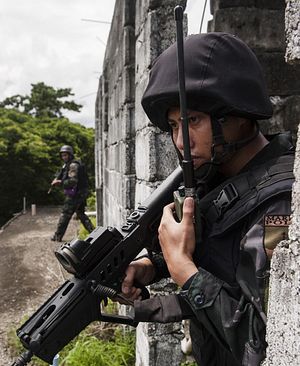Following a brief break, the Philippines National Police (PNP) has re-launched its anti-drug operations this month on President Rodrigo Duterte’s order. Citing a “notable resurgence” in illegal drug activities, the president stated in his memorandum last December that the Philippine Drug Enforcement Agency (PDEA) is undermanned to deal with the re-emergence of the drug threat and it also needs the PNP to expand the narcotics crackdown to the “barangays” (villages) level.
The PNP’s heavy-handed tactics in anti-drug operations has damaged the credibility of the drug war and caused the president’s approval rating to slump at one point. Yet somehow, Duterte has managed to overcome all resistance and restore the PNP’s role in his war on drugs.
Duterte’s war on drugs has had its ups and downs. The first year of the crackdown led to the unprecedented arrest of 86,984 drug suspects. The number of drug surrenders also reached a record high of 1.3 million. However, operations took a brief hit after leaked video footage implicated the PNP in the gruesome death of 17-year-old student Kian Delos Santos. Widespread anger toward the police’s brutal tactics culminated in a series of mass protests in the capital city of Manila and even managed to put a dent in Duterte’s public approval ratings, eventually forcing him to scale back his war on drugs.
Duterte’s political opponents tried to seize upon the public outrage to derail his deadly drug war, but with little success. Impeachment complaints about summary killings linked to his war on drugs were all thrown out. Similarly, Senate inquiries over the drug war ended without any definitive conclusion or formal charge, since majority of the lawmakers are Duterte’s loyalists.
Meanwhile, the Catholic Church, which previously rallied against drug-related killings, has also softened its stance on the issue. The Catholic Bishops Conference of the Philippines (CBCP) recently voiced support for Duterte’s drug war and asked the public not to condemn the extrajudicial killings. The CBCP’s support is significant for the president, since the members of the Church wield considerable influence over the predominantly Christian Philippine population.
The stark shift in attitude is the result of a few factors. First, the Duterte administration has been meeting with the Catholic leadership to get them to support the country’s war on drugs. At the same time, Duterte himself has toned down on his rhetoric on killings and expressed willingness to work with the Church on common interests. Moreover, his personal connection to Archbishop Romulo Valles, the new head of the CBCP, might have also helped to move things in that direction.
Duterte has also sought outside support for his drug war. Increased engagements with China and Japan brought in significant foreign investments that come with no human rights preconditions. This helps to allay investors’ concerns about the trade climate after the European Union threatened to impose economic sanctions if the deadly drug war continues.
The improvements in the political and social climate have made it possible for the president to bring back the PNP to support the drug war. The question now is whether he can deliver a less bloody crackdown to sustain majority support.
According to reports, police already killed five drug suspects in a single day’s operation in Bulacan province on January 10. This figure equals the number of drug-related killings in the previous five weeks. It was not clear if the drug suspects were killed in violent resistance, but no injuries were reported on the police side.
The PDEA approach to the drug problem is to focus on the “big fish,” while that of the PNP is to target drug addicts and drug pushers through door-to-door crackdown. This often led to a high number of deaths of drug suspects, who police claimed had reacted violently to avoid arrest.
Like always, the PNP has vowed to implement a “less bloody” and “more transparent” war against illicit drugs. Yet it also urged the public not to be obsessed with the “smaller incidents” but to see the “bigger picture” and assess the war on drugs based on the number of drug surrenders. This suggests that questionable killings might still occur in the new round of crackdown.
Even so, Duterte’s administration trumpets that the war on drugs has made the country a lot safer, and most Filipinos appear to care more about this than human rights abuses. As revealed in the Third Quarter 2017 Pulse Asia survey, 88 percent of Filipinos support the war on drugs, even though 77 percent of Filipinos also believe extrajudicial killings are taking place. Likewise, a recent poll indicates that the president remains largely popular despite his controversial drug policy.
Lau Seng Yap is a security risk analyst at GlobalMomentum Pte Ltd. He specializes in analyzing geopolitical risks and security threats in the Asia-Pacific region.

































